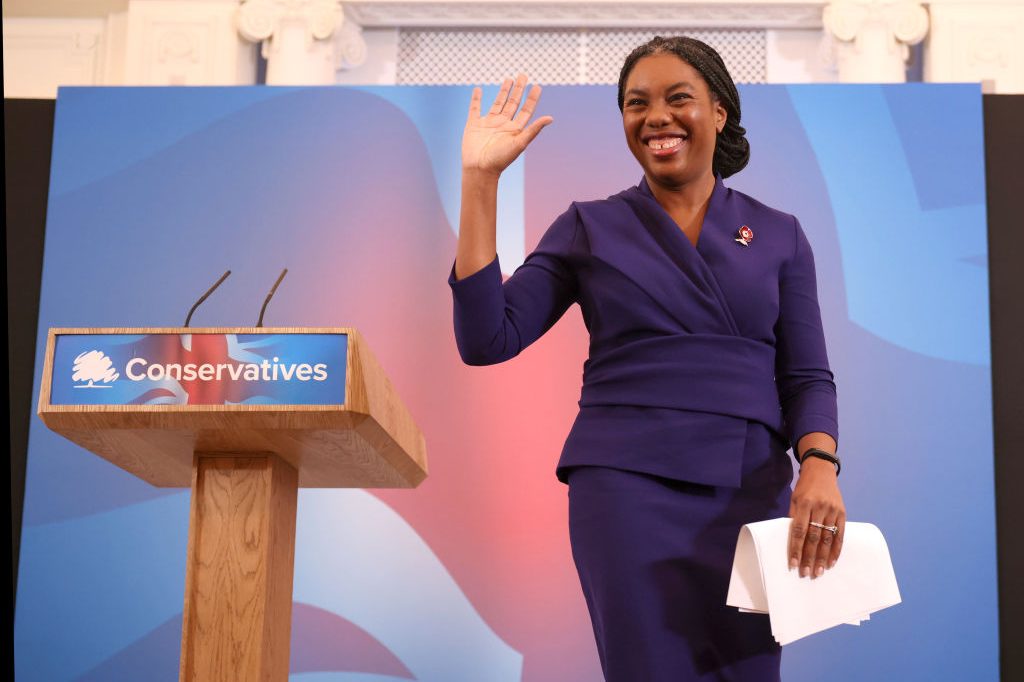The results of the leadership contest for Britain’s Conservatives are in. Almost four months after the Tory Party suffered its worst general defeat in its history, Kemi Badenoch has been crowned as the party’s new leader. Badenoch won 53,806 votes to Robert Jenrick on 41,388 — the turnout was 72.8 percent, down on the 2022 contest which saw a turnout of 82.2 percent.
On being announced as the victor, Badenoch gave a short speech — beginning by thanking her husband Hamish for his support, saying her candidacy would not have been possible without him. Badenoch opted to be magnanimous in victory — praising Rishi Sunak for his hard work and complimenting the runner up despite relations between Badenoch and Jenrick becoming frosty in the second half of the contest. She said that Jenrick would have a big role to play in the Conservative Party for many years to come. As for Badenoch’s message to the party and the wider electorate: “It is time to get down to business, it is time to renew.”
So, was this result a surprise? For a long time — even before the contest was officially called — Badenoch was seen as the one to beat. It was her’s to lose — yet there were moments when it seemed as though she might do just this. Her camp were concerned that Members of Parliament could move to block her from reaching the final two and she had a tricky start to party conference as a result of a row over comments on maternity pay. (She steadied the ship with her leader’s speech.) This week, Badenoch’s camp were nervous about reports of low turnout — fearing it could mean the membership polls were wide of the mark. It’s why Badenoch — who isn’t exactly known for her love of the mainstream media — embarked on a whistle-stop press tour in her final week.
The overall percentages point to it being closer than some of the early membership polls suggested. Badenoch won 56.5 percent of the vote to Jenrick’s 43.5 percent. This is similar to the margin of victory Liz Truss beat Rishi Sunak by in 2022: 57.4 percent to 42.6 percent. Some of Badenoch’s backers had hoped for a clear margin of victory to help Badenoch command authority over the party. It’s not gone unnoticed by senior Tories that no candidate managed to secure the support of more than a third of the party. The last time that happened was the 2001 Conservative leadership contest and it didn’t end well for the victor Iain Duncan Smith.
She faces an uphill task transforming her party’s fortunes.
As for what happens next, Badenoch will now look to form a shadow cabinet and a team for the Leader of the Opposition Office (LOTO). She is very close to her fellow 2017 intake — the small group of Tory MPs elected after Theresa May’s disastrous election campaign. It means key shadow cabinet roles are expected to go to 2017-ers such as Alex Burghart, Andrew Bowie and Julia Lopez. While Lee Rowley, who was elected in 2017 but lost his seat this year, is tipped to be Badenoch’s chief of staff (a full guide to Team Badenoch can be found here).
While a poll today puts the Tories narrowly ahead of Labour, she faces an uphill task transforming her party’s fortunes. Badenoch must grapple with a funding shortfall, a depleted Conservative Campaign Headquarters and a party that has shrunk in size over the past year. Her first big electoral test will be next year’s local elections — though there could well be some by-elections before then, given the number of senior Tories considering standing down.
When it comes to what Badenoch’s election as party leader means for the party’s direction, she has been purposefully light on policy throughout the contest. She takes the view that the party needs to start from the ground up when it comes to returning to its core principles and building from there. It means those hoping for a fully-formed agenda anytime soon are likely to be disappointed. But there are areas where it is clear Badenoch believes the party ought to take a stronger stance — such as identity issues, support for businesses and the UK’s competitiveness, integration and free speech. She told The Spectator in September that she was a “huge fan” of the billionaire and owner of X Elon Musk: “I think Elon Musk has been a fantastic thing for freedom of speech. I will hold my hand up and say, I’m a huge fan of Elon Musk.” She plans to have committees working on policy ideas.
But perhaps the most notable aspect of the Badenoch leadership early on will be tone. The new leader of the opposition has made clear that she believes the Conservatives have become too apologetic. They have lost what they are about and slid into managerialism — this lack of authenticity is, in Badenoch’s view, one of the key factor’s behind that election loss. So while Badenoch is currently trying to reach out across the party, expect her to take a more combative approach when it comes to defending conservatism and facing down her opponents in both Keir Starmer and Nigel Farage.
This article was originally published on The Spectator’s UK website.


























Leave a Reply